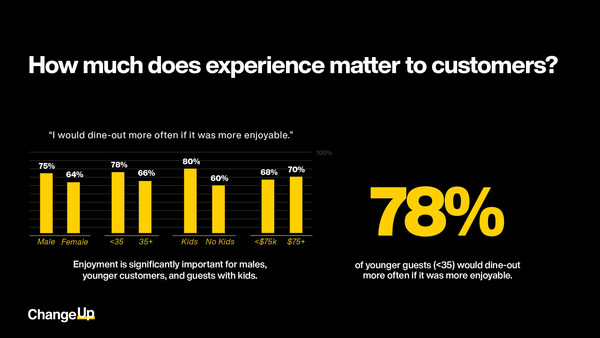Experience Matters: What Restaurant Guests Value
4 Min Read By MRM Staff
Sixty-nine percent of consumers would dine out more often if it were more enjoyable, and that number goes up to 78 percent for adults under the age of 35, according to a report from ChangeUp.
The experience agency, who designed new restaurant prototypes for clients such as Burger King, Panda Express and Panera Bread, surveyed consumers to gain a better understanding of the current customer journey and what guests value most about the restaurant experience, particularly at casual dining and fast casual restaurants.
Among the highlights of How Much Does Experience Matter to Customers:
- More than one third of guests often feel disappointed with the restaurant experience when dining out.
- 66 percent of consumers believe a desirable experience is more important than price and convenience.
Modern Restaurant Management (MRM) magazine reached out to Bill Chidley, Executive Director of Strategy at ChangeUp for a deeper dive into the results and what restaurant operators can learn from them about better engaging with guests.
What key factors are guests reporting disappointment about regarding the dining out experience and how can they be alleviated?
With so many choices available today, guests’ evaluation of the “best option” is more complicated, and their disappointment extends beyond traditional concerns like service quality or food temperature. ChangeUp’s research indicates that diners seek meaningful connections and experiences amid constant change. To address this, restaurants must develop a compelling brand narrative that resonates emotionally with guests, informing every aspect of the dining experience both off and on premise.
By creating a cohesive, story-driven branded environment, what were once “cookie-cutter” chains, can transform into sanctuaries where customers find respite from daily chaos.
By creating a cohesive, story-driven branded environment, what were once “cookie-cutter” chains, can transform into sanctuaries where customers find respite from daily chaos. This not only alleviates disappointment, but fosters lasting loyalty. Yet it requires taking a more comprehensive approach to experience design.
If you provide a disappointing experience to a diner, how can you as an operator recover and re-engage with that guest?
Recovering from a disappointing experience presents an opportunity to showcase your brand's values. Begin by promptly acknowledging and empathizing with the guest's concerns, followed by immediate action and accountability to resolve the issue. The key is to create an 'on-brand response' that aligns with your brand story.
Turn a negative experience into a positive memory where your brand gets credit. We encourage our clients to go beyond ‘in-the-moment’ remedies by reaching out personally and inviting the customer back for a curated experience that highlights your brand's strengths. This approach can transform a disappointed diner into a loyal advocate, eager to share their positive redemption story.
In what ways are the role of value connected to the dining experience now?
The concept of value in dining is evolving, and our research reveals that guests now have a broader set of criteria. Many prioritize experience over price and convenience, indicating a fundamental shift in value perception. The top drivers we've identified in our 2024 restaurant report are comfort and relaxation, sensory delight, and personal connection. These factors account for over half of what guests value, demonstrating that emotional and sensory aspects now play a higher role.
In our work with clients like Burger King, we've created a brand-led experience that delivers their story and introduces aspects of their brand that trigger positive emotional connections from their rich history, and ‘signature moments’ that make you smile.
Restaurants can deliver greater perceived value to their guests if they focus on experiences that make them distinctive in positive ways through embodying their brand in the restaurant design and how they service the guest. This approach helps fortify restaurant concepts against economic pressures and allows them to win a larger share of tightening guest budgets.
Did any results surprise you? Did you notice any differences across the demographics?
Several findings stood out, particularly regarding demographic differences. Younger guests, especially those under 35, are driving a more experience-focus in dining choices. They're significantly more likely to increase their dining frequency based on improved experiences compared to older age groups.
Surprisingly, over a third of diners often feel disappointed by their dining experiences, presenting a clear opportunity for improvement. Across all age groups, but particularly with younger diners, experience is increasingly valued over both price and convenience, especially for dinner. These insights underscore the critical importance of creating engaging experiences.
How can technology and data help restaurants better understand their diners and be more responsive to their needs?
A multi-faceted approach combining sentiment analysis, digital diaries, and deep-dive quantitative surveys provides a comprehensive understanding of diners' needs. Sentiment analysis offers real-time insights into customer satisfaction across various platforms. Digital diaries capture in-the-moment feedback and biases in wants and needs, helping restaurants understand the entire customer journey.
A multi-faceted approach combining sentiment analysis, digital diaries, and deep-dive quantitative surveys provides a comprehensive understanding of diners' needs.
Deep-dive quantitative surveys offer a broad view of customer preferences and behaviors, along with visibility in how your brand is perceived and used. By leveraging these methodologies, restaurants can develop a holistic understanding of their customers, enabling them to create more responsive, relevant dining experiences. At ChangeUp, this data-driven and insight-rich approach is key to driving our process in re-imagining experiences for our clients.
"There's no denying that customers' evolving preferences are reshaping the restaurant landscape, but it's clear that the dine-in experience remains critical in delivering value," said ChangeUp's Chief Creative Officer, Ryan Brazelton. "At ChangeUp, we believe these shifts shouldn't be something restaurants fear, but something that provides endless opportunity for reinvention and innovation."
ChangeUp conducted the survey in Q2 2024 of more than 500 people nationwide. Respondents had to be over the age of 22 and responsible for making decisions on where to eat out. ChangeUp balanced age and income to census to ensure the survey could look for demographic differences.

